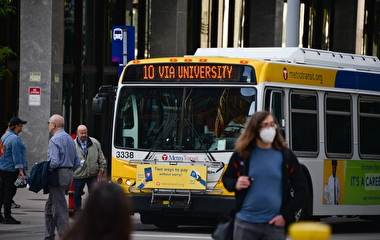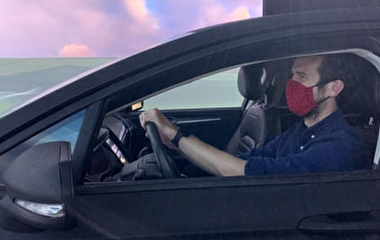Truck drivers who don’t follow through with employer-mandated treatment for obstructive sleep apnea (OSA) have a higher risk of serious crashes, according to U of M research. This ongoing work, which has implications for both trucking companies and policymakers, was honored with the 2019 Robert C. Johns Research Partnership Award.
“Our study examined the first-ever employer-mandated program for diagnosing and treating this dangerous disease,” says Stephen Burks, professor of economics and management at the University of Minnesota Morris (UMM). “We found a large and statistically significant association between non-adherence with OSA treatment and preventable tractor-trailer crashes.”
Researchers analyzed a program that Schneider, a major motor carrier, had initiated to screen, diagnose, and treat its drivers for OSA. Their work, sponsored by the Roadway Safety Institute, involved a mix of disciplines including economics, human factors, medicine, and statistics.
“Our findings reinforced the decision by Schneider to continue its OSA program,” Burks says. The results have also been cited by at least one other large motor carrier in its decision to institute an OSA program internally.
In addition to UMM and Schneider, partnering organizations were Harvard Medical School, Precision Sleep Solutions, the Virginia Tech Transportation Institute, and Enterprise Resources, LLC.
In ongoing research, the project team is analyzing differences in per-member, per-month medical insurance costs that are associated with the OSA program (other than those of the OSA program itself). The goal is to determine if the carrier can fund the OSA program from the savings generated in medical insurance claims, Burks says.
The Research Partnership Award was renamed this year in honor of former CTS director Robert Johns, who provided visionary leadership in recognizing that the most effective research to address today’s complex transportation challenges is often a result of interdisciplinary teamwork and partnerships. The award is presented annually to a team of individuals who have collaboratively drawn on their diverse expertise to achieve significant impacts on transportation.
“Interdisciplinary research in academia is not easy,” Johns says. “The research culture is driven by single faculty as principal investigators. They lead research projects, supported by students and at times research staff. But transportation issues often need the perspectives of multiple disciplines. I am very honored to have this award named for me—an award that reinforces the importance of interdisciplinary research and external partnerships.”



